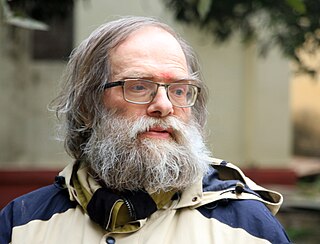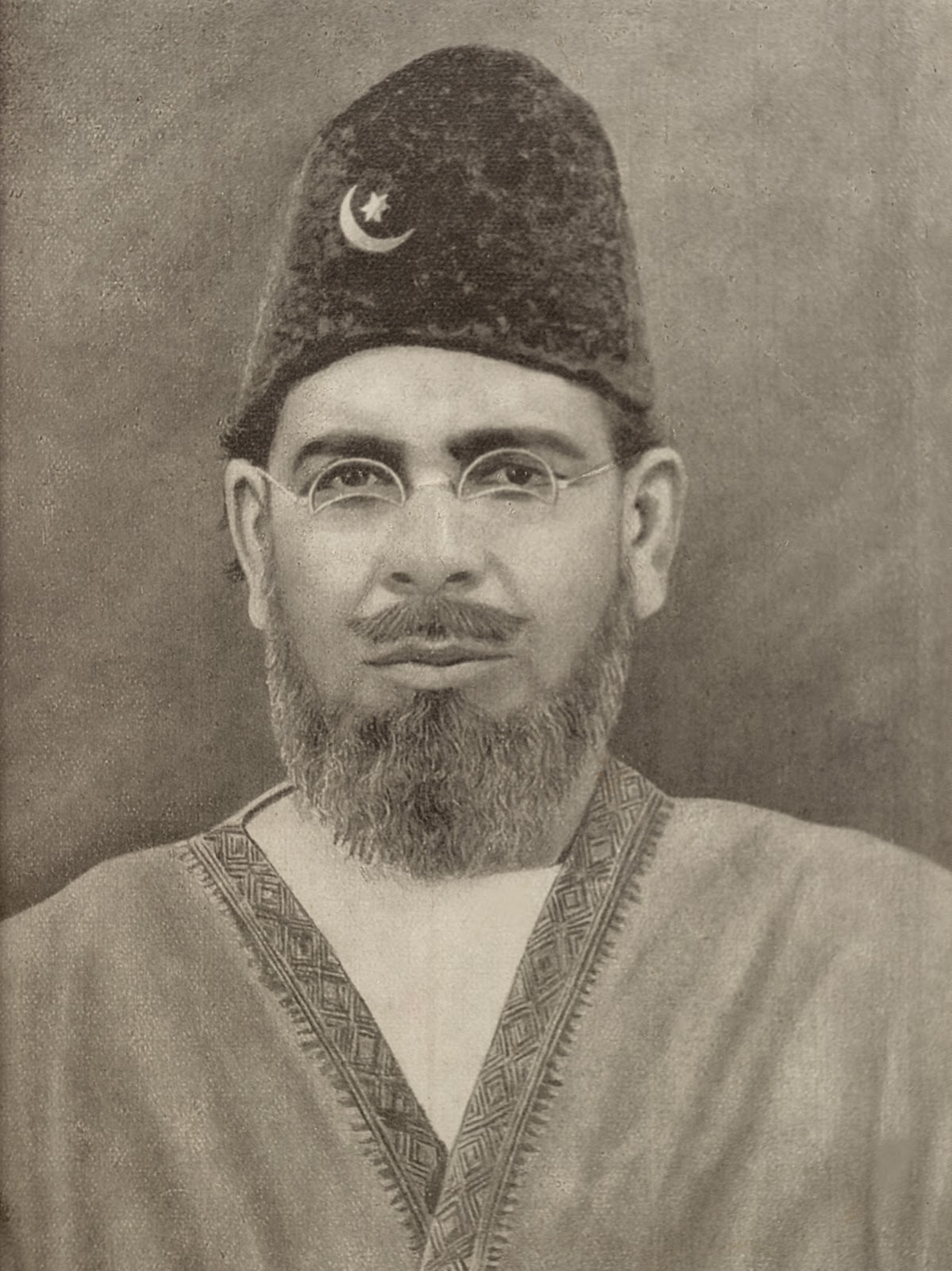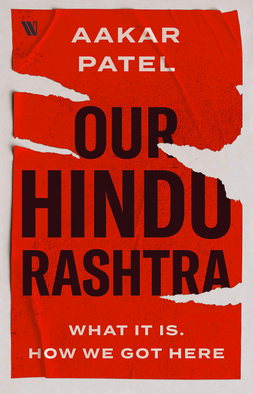Related Research Articles

Hindus are people who religiously adhere to Hinduism. Historically, the term has also been used as a geographical, cultural, and later religious identifier for people living in the Indian subcontinent.
The term pseudo-secularism is used to describe individuals who claim to be secular but may display biases towards a particular religion, whether consciously or unconsciously. This term has gained popularity in recent Indian politics, where it is often used to criticize individuals who identify as secular and advocate for minority rights while remaining silent or opposing concerns faced by the majority religion. Some Hindu nationalist politicians, who are accused of promoting communalism, employ this term as a counter-accusation against their critics, alleging that the secularism followed by the Indian National Congress and other parties is flawed or distorted.

Koenraad Elst is a Flemish author, known primarily for his adherence to the Hindutva ideology and support of the Out of India theory. Scholars accuse him of harboring Islamophobia.

Vinayak Damodar Savarkar, Marathi pronunciation: [ʋinaːjək saːʋəɾkəɾ]; 28 May 1883 – 26 February 1966) was an Indian politician, activist, and writer. Savarkar developed the Hindu nationalist political ideology of Hindutva while imprisoned at Ratnagiri in 1922. He was a leading figure in the Hindu Mahasabha. He started using the honorific prefix Veer ("brave") since he wrote his autobiography. Savarkar joined the Hindu Mahasabha and popularized the term Hindutva (Hinduness), to create a collective "Hindu" identity as an essence of Bharat (India). Savarkar was an atheist.

Mohd. Ahmad Khan v. Shah Bano Begum [1985 (1) SCALE 767 = 1985 (3) SCR 844 = 1985 (2) SCC 556 = AIR 1985 SC 945], commonly referred to as the Shah Bano case, was a controversial maintenance lawsuit in India, in which the Supreme Court delivered a judgment favouring maintenance given to an aggrieved divorced Muslim woman. Then the Congress government enacted a law with its most controversial aspect being the right to maintenance for the period of iddat after the divorce, and shifting the onus of maintaining her to her relatives or the Waqf Board. It was seen as discriminatory as it denied right to basic maintenance available to Muslim women under secular law.

Indian nationalism is an instance of territorial nationalism, which is inclusive of all of the people of India, despite their diverse ethnic, linguistic and religious backgrounds. Indian nationalism can trace roots to pre-colonial India, but was fully developed during the Indian independence movement which campaigned for independence from British rule. Indian nationalism quickly rose to popularity in India through these united anti-colonial coalitions and movements. Independence movement figures like Mahatma Gandhi and Jawaharlal Nehru spearheaded the Indian nationalist movement. After Indian Independence, Nehru and his successors continued to campaign on Indian nationalism in face of border wars with both China and Pakistan. After the Indo-Pakistan War of 1971 and the Bangladesh Liberation War, Indian nationalism reached its post-independence peak. However by the 1980s, religious tensions reached a melting point and Indian nationalism sluggishly collapsed. Despite its decline and the rise of religious nationalism; Indian nationalism and its historic figures continue to strongly influence the politics of India and reflect an opposition to the sectarian strands of Hindu nationalism and Muslim nationalism.

Muhammad Ali Jauhar was an Indian Muslim activist, founding member of the All-India Muslim League, a preeminent member of Indian National Congress, journalist and a poet, a leading figure of the Khilafat Movement and one of the founders of Jamia Millia Islamia.
Najm al-Ḥasan, also known as Najmul Millat or Najmul Ulama, was an Islamic jurist and the founder of Jamia Nazmia, the oldest Shia religious institution of India.

Mahmud Hasan Deobandi was an Indian Muslim scholar and an activist of the Indian independence movement, who co-founded the Jamia Millia Islamia university and launched the Silk Letter Movement for the freedom of India. He was the first student to study at the Darul Uloom Deoband seminary. His teachers included Muhammad Qasim Nanautawi and Mahmud Deobandi, and he was authorized in Sufism by Imdadullah Muhajir Makki and Rashid Ahmad Gangohi.

Dwijendra Narayan Jha was an Indian Marxist historian who studied and wrote on ancient and medieval India. He was a professor of history at Delhi University and a member of the Indian Council of Historical Research. Some of his books include Ancient India: In Historical Outline (1997), The Myth of the Holy Cow (2001), and Early India: A Concise History (2004). Through his works he argued against the communal distortions of history including challenging popular beliefs of the sanctity of cow and Indian beef eating tradition.

Hindu Munnani is a right-wing Hindu nationalist organisation based in the Indian state of Tamil Nadu. Hindu Munnani was set up by Rashtriya Swayamsevak Sangh (RSS) The organisation was founded in 1980 by Ramagopalan, a member of RSS and since its formation served as the platform for RSS and its subsidiaries known as the Sangh Parivar.

Ram Puniyani is a former professor of biomedical engineering and former senior medical officer affiliated with the Indian Institute of Technology Bombay. He began his medical career in 1973 and served IIT in various capacities for 27 years, beginning in 1977. He has been involved with human rights activities and initiatives to oppose Hindu fundamentalism in India and is currently the President of the Executive Council of the Centre for Study of Society and Secularism (CSSS).
Hindu nationalism has been collectively referred to as the expression of social and political thought, based on the native spiritual and cultural traditions of the Indian subcontinent. "Hindu nationalism" is a simplistic translation of हिन्दू राष्ट्रवाद. It is better described as "Hindu polity".
"Lab Pe Aati Hai Dua", is a duʿā or prayer, in Urdu verse authored by Muhammad Iqbal in 1902. The dua is recited in morning school assembly almost universally in Pakistan, and in Urdu-medium schools in India.
There have been several instances of religious violence against Muslims since the partition of India in 1947, frequently in the form of violent attacks on Muslims by Hindu nationalist mobs that form a pattern of sporadic sectarian violence between the Hindu and Muslim communities. Over 10,000 people have been killed in Hindu-Muslim communal violence since 1950 in 6,933 instances of communal violence between 1954 and 1982.

Maulana Syed Shahabuddin Salfi Firdausi was an Indian Islamic scholar, author and peace activist. He founded Athar Blood Bank in 2012 at Solapur.

Historiography is the study of the methods of historians in developing history as an academic discipline, and by extension is any body of historical work on a particular subject. The historiography of a specific topic covers how historians have studied that topic using particular sources, techniques, and theoretical approaches. Historiography is defined as "the study of the way history has been and is written – the history of historical writing", which means that, "When you study 'historiography' you do not study the events of the past directly, but the changing interpretations of those events in the works of individual historians."

Hindu–Muslim unity is a religiopolitical concept in the Indian subcontinent which stresses members of the two largest faith groups there, Hindus and Muslims, working together for the common good. The concept was championed by various persons, such as leaders in the Indian independence movement, namely Mahatma Gandhi and Khan Abdul Ghaffar Khan, as well as by political parties and movements in British India, such as the Indian National Congress, Khudai Khidmatgar and All India Azad Muslim Conference. Those who opposed the partition of India often adhered to the doctrine of composite nationalism.
Shia College is a college located in old Lucknow, Uttar Pradesh, India. It is affiliated with the University of Lucknow and one of the institutes of higher education in India.

Our Hindu Rashtra is a book about Hindu majoritarianism in India by journalist Aakar Patel, published by Westland Books in 2020. It surveys historical documents, government committee reports, court judgments, media archives, and records personal anecdotes on a range of issues. It argues that India is today a Hindu state in practice, and that the erosion of secularism in India began soon after India became independent, although the process accelerated after the election of Narendra Modi as Prime Minister in 2014.
References
- ↑ Salam & Parvaiz 2020, p. 179.
- 1 2 3 4 5 Ahad, Rehan (19 April 2019). An Explorative Talk with Mr. Ziya Us Salam. Tawarikh Khwani. Event occurs at 1:30–14:02. Retrieved 19 March 2021.
- ↑ "Salam, Ziya". SAGE Publications Inc. 22 August 2021. Archived from the original on 28 July 2021. Retrieved 6 September 2021.
- ↑ Asad, Rehan (20 April 2019). "A talk with Ziya Us Salam". Tarikh Khwani. Retrieved 6 September 2021.
- ↑ "Micro review: 'Till Talaq Do Us Part' is a powerful read aimed to shatter misconceptions over Triple Talaq". The Times of India . Times News Network. 27 September 2018. Archived from the original on 9 November 2020. Retrieved 19 March 2021.
- ↑ Salam, Ziya Us (3 July 2018). "'I am the other': Have India's Muslims been systematically pushed out of the mainstream?". Scroll.in . Archived from the original on 18 January 2021. Retrieved 19 March 2021.
- ↑ Sajjad, Mohammad (14 September 2018). "Of identity & hope". Frontline . Archived from the original on 17 January 2021. Retrieved 19 March 2021.